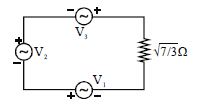Three alternating voltage sources $V_1$ = $3 sin \omega t $ volt , $V_2= 5 sin(\omega t + \phi _1)$ volt and $V_3 = 5 sin(\omega t -\phi_2 )$ volt connected across a resistance $R= \sqrt {\frac{7}{3}} \Omega $ as shown in the figure (where $ \phi_1$ and $ \phi_2$ corresponds to $30^o $ and $127^o $ respectively). Find the peak current (in Amp) through the resistor

Three alternating voltage sources $V_1$ = $3 sin \omega t $ volt , $V_2= 5 sin(\omega t + \phi _1)$ volt and $V_3 = 5 sin(\omega t -\phi_2 )$ volt connected across a resistance $R= \sqrt {\frac{7}{3}} \Omega $ as shown in the figure (where $ \phi_1$ and $ \phi_2$ corresponds to $30^o $ and $127^o $ respectively). Find the peak current (in Amp) through the resistor

- A
$3$
- B
$4$
- C
$5$
- D
$6$
Similar Questions
If an alternating voltage is represented as $E = 141\,sin\, (628\,t),$ then the rms value of the voltage and the frequency are respectively
If an alternating voltage is represented as $E = 141\,sin\, (628\,t),$ then the rms value of the voltage and the frequency are respectively
Assertion : Ohm’s law cannot be applied to $a.c$ circuit.
Reason : Resistance offered by capacitor for a.c source depends upon the frequency of the source.
Assertion : Ohm’s law cannot be applied to $a.c$ circuit.
Reason : Resistance offered by capacitor for a.c source depends upon the frequency of the source.
- [AIIMS 2009]
A resistance of $20$ ohms is connected to a source of an alternating potential $V = 220\,sin\,(100\,\pi t)$. The time taken by the current to change from its peak value to r.m.s value is
A resistance of $20$ ohms is connected to a source of an alternating potential $V = 220\,sin\,(100\,\pi t)$. The time taken by the current to change from its peak value to r.m.s value is
The effective value of current $i = 2\, sin\, 100\, \pi\, t + 2 \,sin(100\, \pi \,t + 30^o)$ is :
The effective value of current $i = 2\, sin\, 100\, \pi\, t + 2 \,sin(100\, \pi \,t + 30^o)$ is :
An alternating current is given by the equation $i = {i_1}\cos \,\omega \,t + {i_2}\sin \omega \,t$. The r.m.s. current is given by
An alternating current is given by the equation $i = {i_1}\cos \,\omega \,t + {i_2}\sin \omega \,t$. The r.m.s. current is given by
